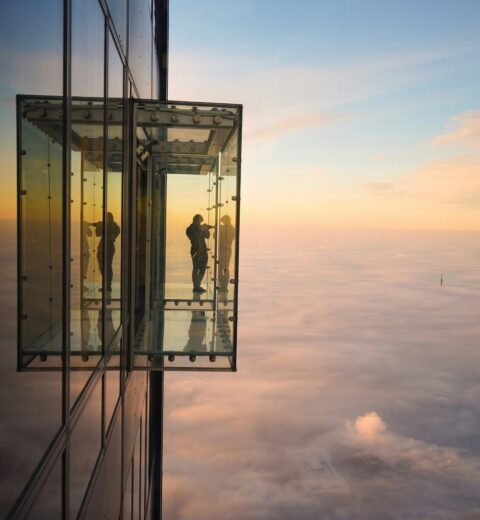The Enterprise Product :: An Interview with Philip Ellis @ Techspace
Week 17 – London. This week in The Workplace Series eOffice founder, Pier Paolo Mucelli, has visited the ambitious company Techspace. Since it was founded in 2012, the firm has grown into an inspiring workplace that offers coworking and workspace for the tech community and its scale-up tech teams. In this interview, Philip Ellis, Chief Commercial Officer (CCO) at Techspace, tells us all about their journey, expansion, and product among other intriguing facts.

Can you tell us more about the history of Techspace?
Yes! Essentially, in the early days we ran a digital agency. It all started when we took on a lease in Clerkenwell with about 3000 sq ft. This was far too much space for our 5 person team, so alongside the agency, we started to sublet some desks to creative professionals and individuals who wanted a desk in the area. Quite quickly, we realised that the atmosphere in the office was more lively, and the profits weren’t bad either. As a result, we realised that we had been presented with a great opportunity to rent out workspace to small businesses.
At that time, we had the opportunity to secure some more property in Old Street and realised that there was demand from growing companies to take on space in that area. So, we took on a small 2000 sq ft. space in Old Street, with a company we called Whitespace.
Was Whitespace the original brand?
Yes, that was the original brand which focused more on companies within creative industries. At this point, we had moved from Clerkenwell, and when we moved into our second location on Bath Street, Old Street we decided to rebrand to Techspace London. We rebranded because we wanted to provide space for tech companies (rather than creative industries) and that pleased us, because we also believed we could also scale like a tech company. Of course, originally we were Techspace London, but because of our plans to expand into Europe, we have since shortened this to ‘Techspace’.

And how many spaces do you currently have?
We have five spaces right now: one in Hoxton, Old Street, Shoreditch, Whitechapel, and this new building in Aldgate. Then we have plans to take on another couple of properties in early 2017, which are also in East London.
Is this your biggest space?
Well, I believe both Whitechapel and Aldgate are the two biggest spaces as they are about 30 000 sq ft. each and both accommodate about 450 members.
You mentioned that you are taking on more properties, do you have a specific expansion strategy?
When it comes to our properties we have typically targeted more fringe areas as this way we can pass on the cost savings to our clients. Unfortunately, with market fluctuations which have come about since Brexit, we had a situation where demand took a hit, but on the other hand, landlords have become more uncertain, and we therefore had the opportunity to take on more property. As a result, we’ve seen that there is more availability in more central areas (such as Old street and Shoreditch), whereas before, there was much less opportunity in these areas.
Regarding our growth plans, we will definitely continue our growth in London, but we also aim to move into more European cities too. In fact, within the next three years, we aim to reach 25 locations in total. Most of these will be in London, but also in a few international cities such as Berlin. Providing all is well, we may consider European cities such as Lisbon, Amsterdam, and Stockholm, but the testing ground is definitely Berlin.
Initially, did you grow the business organically?
Yes, it was very much boots-strapped from day one. The co-founders (Alex and David) put money forward and we reinvested profit for 3 years. Then, in April 2016, we secured a 5-million-pound Series A round. This helped us kick forward and start expanding without having the constraints that we had before.

How do you see the level of competition at the moment and how do you differentiate to the various competitors?
Well, there are a lot of great spaces out there. Particularly some of the larger US companies who have shown a lot of people the true potential of the coworking sector. A lot of these companies though are focused on the early stage lifecycle of a company, the entrepreneurship and supporting the culture that goes along with this.
Our market is more about the scale-up tech sector. We’re supporting high growth companies and facilitating this journey. A lot of the competition offer space for creative industries (SMEs, agencies, funds or perhaps international offices) which is fine, but this means they have hugely diverse and therefore diluted communities. At Techspace we only work with technology companies, which means that our community is niche – this is a powerful thing as from this we can provide a tailored and focused service. Members who are further down the road in their life-cycle are able to share invaluable knowledge with those at an earlier stage. We have like-minded individuals working alongside like-minded companies, who are all working to overcome similar problems. There’s a lot of value to harness there, that’s what I mean by a rich community – members are essentially surrounded by invaluable and relevant knowledge, and that’s something that could make or break your company.
At Techspace, we also value the requirement for flexibility. We start with flexible, on-demand desks where companies can grow quite quickly from 5 to 15 people. Then we offer private offices for those companies who require more privacy, but still want to share amenities with the community. Then our most popular membership is Enterprise, which offers larger companies an exclusive, self-contained space to themselves.
The Enterprise product is best suited to later-stage companies considering leasehold, as you don’t have to contribute huge amounts of money into the fit-out, you don’t have to wait 6-8 weeks on legals, and you don’t have to tie yourself into a lease agreement which you can’t get out of for 5 years. You have a 2 month notice period, you pay monthly, you get a great fit-out, the building is managed for you, and you get to brand the space as your own. It’s also a great way to minimise risk on your downside, and your upside. Consider you outgrow your lease in 2 years, you get penalised for growing your company! It shouldn’t be this way – so Enterprise is our solution to this.
The enterprise product: A scale up product that gives you all the benefits of a lease, with none of the hassle.

Philip, regarding branding, how do you leverage your Techspace brand with your clients need to brand the space?
Techspace typically takes a bit of a backseat in terms of branding. If you look around in the space here, we don’t have any branding. In fact, companies are enabled to brand the spaces themselves. Right now we are standing in a space where the company moving in is customising the space. We want companies to feel like it’s their office, by taking ownership of the space. Actually, I don’t think there are many spaces that can offer anything like this out there, most serviced office spaces give you a very limited capacity to personalise your space.
From a commercial point of view, would you price this space per desk or per size?
Well, it depends on the product. We always break it back to the per-desk-price because that is the market standard. At the same time, a lot of our clients are looking at leaseholds and want a direct comparison. Therefore, we usually give both: we have a self-contained monthly price as well as a price per desk.

So, you are building a community of tech companies. Do you work with the community and engage it?
At the moment we are concentrating a lot on growing our square footage. The last 12 months we have been focusing on making sure that we are acquiring the right buildings.
We plan to open up an event space next year, this will give us the opportunity to work with more partner brands within the community.

Now, let us move on to the technology point of view. Are there any specific requirements that your clients ask for, and how do you manage the technology within your spaces?
In terms of connectivity, we provide a 1GB connection in all of our spaces. Regarding technology, our in-house tech team build our own systems. This is pretty much the engine room of Techspace, as we use our own proprietary technology to help us manage our facilities.
As you might imagine by virtue of managing over 1000 members in five locations, a lot of the baseline requirements need to be in place before you can kick on and do all of the fluffy community stuff. So, as a result, we have focused a lot on the baseline infrastructure of our spaces, the internet connection being the focal point here, as a lot of these tech businesses would not stick around if that wasn’t up to scratch.
Is the tech work in order to provide the technology to your customers or to promote your services online?
It’s both. It’s partly in order to run spaces efficiently, which reduces friction for our members, but it’s also everything the members see in the online members’ area and iOS/ Android apps. Saying that we also have an app which is used by our facilities team. Essentially, each of our facilities managers uses this to manage 30 000 sq ft. each, and they can manage everything through the app. By making a digital representation of every floor, every building, every zone, and every product in every space, our facilities managers can do a walk through every morning with this app and raise issues where they notice issues and log this on their phones.
Did you build this product?
Not me personally, but yes, our technology team have – it’s all proprietary technology. This is the turn-key approach we’re taking which will enable us to scale the company to 600 000 square feet in 3 years.

And Philip, to finalise, what are the main challenges and opportunities you see in the next few years for your company?
I think the greatest challenge is taking the company international. We are looking to launch in Berlin, which means everything about the space and the market is new and different to what we’re used to.
To make this work we have employed a German speaking expansion manager which is key here. This allows us to be sensitive to the German market.
Another challenge is the team. We have grown from 6 people to 21 in the space of six months. Which just shows you that we’re also going through the same pain points as our members. Scaling up is difficult, hiring a tech team is difficult, holding on to people is difficult. At the same time, the whole process is a lot of fun, so if you ask me again in a year, I hope I will give you the same answer!
Thank you for the great hospitality Philip Ellis and Techspace!




